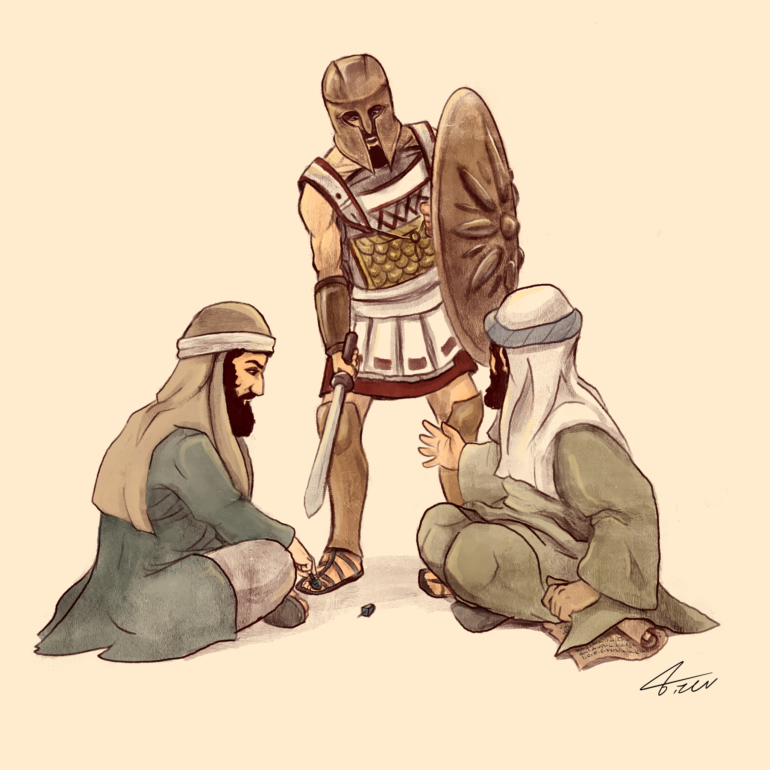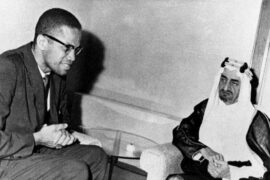The fifteenth chapter of a podcast series on the first Book of Maccabees.
For more content from VISION Magazine, subscribe to our newsletter and follow us on Twitter @VISION_Mag_, Facebook and YouTube. If you haven’t already, don’t forget to subscribe to our podcast on SoundCloud, iTunes, Stitcher, TuneIn, or Spotify and leave a rating and review to help us get our message out to a wider audience!
To support the podcast, head over to our PayPal portal and be sure to write a note that your contribution is for the podcast.
Hosted by: Robert Goodman
Transcript:
Shalom Aleikhem! And welcome back to Sefer Maccabim!
Last time we learned how Judea experienced a golden age while Shimon ruled it. Now we’re going to see how the Greeks had the nerve to invade Judea yet again and how Shimon rebuffed them, both verbally and physically.
You’ll remember how back in chapter 13, after Tryphon took Yehonatan prisoner, he murdered Alexander’s son Antiochus VI and crowned himself king.
But he proved to be such a horrible ruler that the people revolted from him and wanted Demetrius II to be their king instead. Just one problem: Demetrius is being held captive in Persia after his failed campaign against the Parthians. However, he does have family still within the empire. His wife Cleopatra, his children, who are living in the city of Seleucia, and his brother, Antiochus VII.
The thing is, though, recognizing they could represent a threat to his rule, Tryphon has ordered that Demetrius’s brother Antiochus not be permitted to enter any of the major cities. So had Tryphon’s forces been loyal to him they would have made sure that Cleopatra and Antiochus would had no contact with each other.
But as we mentioned, Tryphon is an awful ruler and every day more of his soldiers are going over to Antiochus, who is seen as the replacement for Demetrius, and eventually Cleopatra is able to send a letter out to Antiochus, in which she invites him to marry her and to take over the kingdom.
Antiochus goes to fight Tryphon and wins a great victory, following which Tryphon flees to the port city of Dora. Antiochus follows him and traps him in the city by besieging it on three sides with soldiers, and with a blockade of boats on the seaward side, preventing anyone from entering or leaving.
It’s expensive to maintain such a siege and Antiochus sends ambassadors to Shimon requesting an alliance, hoping that Shimon will assist him with the siege against Tryphon.
Shimon is happy to oblige, not least because Tryphon was the one who murdered his brother, and sends a large quantity of provisions to Antiochus, as well as two thousand soldiers to aid him. So you’d hope Antiochus would show a little gratitude.
But no such luck.
You may remember how back in chapter 11, Demetrius, Antiochus’s brother, requested Yehonatan’s help in the fight against Tryphon and promised great rewards to follow, but after Yehonatan sent soldiers who won the fight for Demetrius I, Demetrius went back on his word and started harassing the Jews. Well Antiochus VII follows suit. Despite the assistance Shimon affords him in besieging Tryphon, Antiochus does a 180 degree turn and becomes Shimon’s enemy. He sends one of his friends named Athenobius who meets with Shimon and delivers him the following message:
“You have in your possession Jaffa and Gezer and the citadel in Jerusalem, cities of my kingdom. You have laid waste their borders, and played great havoc in the land. You have taken possession of many places in my kingdom. Now, then, hand over these cities that you have taken, and the tribute of the places outside the borders of Judea that you have appropriated. If you refuse, then give me instead five hundred talents of silver; for the damage that you have done and for the tribute of the cities, another five hundred talents. Unless you do this, we will come and make war on you.” (Maccabees I 15:28-31)
Sound familiar? Athenobius is essentially telling Shimon, “You stole our land. You illegally conquered that which rightfully belongs to Seleucid Greece. Now either return the land to us or pay us a shedload of money, or else we’re going to fight you.”
What’s Shimon’s response? He takes one look at Athenobius and says, “Ha ha, good one.”
All right he doesn’t actually use those words but he gives a firm and comprehensive reply explaining why, in fact, Anthenobius is wrong. The text (Maccabees I 15:33-34) reads as follows:
Shimon replied, “We have neither taken foreign land, nor do we hold dominion over other people’s territory, but only over the inheritance of our fathers, from which we were unjustly banished by our enemies. And now we have seized the opportunity to return and hold the inheritance of our fathers.”
Shimon tells Athenobius that in fact this land does not belong to the Seleucids but was originally part of the Jewish kingdom of first Temple times. The Hebrews were unjustly expelled from it by Assyria and later by Babylon, and now, hundreds of years later, they have returned to liberate what is rightfully theirs.
Shimon clarifies the Jewish position to the enemy and professes the Jewish commitment to the land and also demonstrates a willingness to fight for it.
Now believe it or not, Shimon’s example actually does have a precedent. In Parshat Ḥukat the Torah tells us about in Israel’s fortieth year in the desert, when they were approaching Eretz Yisrael, they conquered land from the Amorite king Siḥon who attacked them when they tried to peacefully pass through his territory on the way to the land.
This territory was originally owned by the nations Ammon and Moav, was then conquered by the Amorites who were then conquered by Israel, and that land on the east bank of the Jordan was settled by some of the tribes of Israel.
Now the Haftara of Ḥukat from Sefer Shoftim tells us how 300 years after the conquest, the king of Ammon comes to Israel and sends a message to Yiftaḥ, the judge leading the Jewish people at that time: “Yiftaḥ, you stole our land. You took land owned by our forefathers when you left Egypt, now return these lands in peace and we won’t have to attack you.”
It’s the land for peace argument again.
But Yiftaḥ sends messengers back to the king saying: “You have no right to these lands on the eastern side of the Jordan. We never conquered them from you – we conquered them from Siḥon and the Amorites. Furthermore, we’ve been living in these lands for 300 years now – if they’re clearly so important to you, why did you not come before to reclaim them? I have not sinned against you, but you do wrong to make war against me; may HaShem judge today between the children of Israel and the children of Amon.”
Note Yiftaḥ’s last words, “may HaShem judge today between the children of Israel and the children of Amon,” implying that Yiftaḥ is ready to fight if necessary. The king of Amon doesn’t listen to Yiftaḥ and invades anyway, but HaShem is with Yiftaḥ and Ammon is swiftly defeated before Bnei Yisrael.
We see here how the Torah teaches us the proper approach for responding to our enemies who make accusations against us demanding we return their land.
First we do have a duty to explain our position, our history on this land and why we are here, and importantly, show we are genuinely committed to Eretz Yisrael and are willing to fight for her.
If they still don’t listen and declare war against us, then we have free reign to go out to battle and fight them.
But the Torah is teaching us that not only is there value in explaining the Jewish narrative to non-Jews, there is a responsibility to do so. Bear in mind I’m not talking about shallow hasbara talking points trying to paint Israel as a Western democracy with drip irrigation and gay rights. I’m talking about sharing a genuine message, speaking about our roots in this land and our eternal commitment to her, how we were unjustly exiled by our enemies and returned against all odds, about Jewish identity and our historic aspirations, what kind of society we are here to create, and yes – even what role the Palestinians would play in such a society.
We do have an obligation to articulate our position on the battlefield, whether it be on college campus or in global politics; articulating the Jewish position serves a twofold purpose.
Firstly, it reinforces our convictions and strengthens our resolve, for when we see our leaders calmly and confidently articulating our position in the face of either an invading army or a political onslaught, we are encouraged and reminded of the inherent justice of the Jewish struggle for settling the land of Israel and constructing a society which will serve to elevate all of mankind.
There is no struggle more just than ours, but we need to understand what we’re fighting for. And when we hear our leaders articulate it for us, this strengthens us to keep fighting.
The second purpose achieved by effective communication with the non-Jewish world is that there are many righteous gentiles who are genuinely committed to pursuing justice and fighting for the oppressed, and if they understood our struggle they would fight alongside us, but because they aren’t informed, they don’t, because they aren’t given all the information. And perhaps that’s our fault.
The situation in the Jewish world today seems to be that the Jews who recognize the need for effective communication with the non-Jewish world aren’t connected enough to Jewish history to represent us accurately, and those Jews who are deeply connected to Jewish history and committed to our historic mission scorn the need for communication with the outside world as a weakness.
The Torah’s lesson is that you can’t have one without the other. We need more Jews – especially young Jews – who are deeply living in Jewish history and committed to our national mission of elevating all mankind, but are also able and willing to communicate that struggle to non-Jews in a language they can understand.
Returning to our story, Athenobius does not respond to Shimon’s reply even one word. Perhaps he’s too angry at Shimon’s defiance, perhaps he can’t think of anything to say. In any case, we know he is extremely angry, because he returns to Antiochus and relates Shimon’s reply, and the king becomes inflamed.
Now, just like the king of Ammon over 850 years previously, Antiochus VII declares war. He gives over his entire navy as well as a large number of cavalry and foot soldiers to one of his generals named Cendebus, with the instructions to enter Judea and do as much harm as he could, with specific instructions to fortify the town of Kidron and use it as a base from which to launch further attacks.
In the meantime, Antiochus would pursue Tryphon, who somehow slipped through the siege of Dora and escaped northward to Apamea in modern-day south-west Turkey (Antiochus eventually caught up with Tryphon and killed him).
So General Cendebus journeys south to Yavne near the coast, pitches camp, builds up Kidron and stations soldiers there, and begins to take local Jews captive and slay them. He’s really making trouble.
Shimon, of course, just like Yiftaḥ, is not going to take this lying down, and in the next chapter we’ll see how he responds.





